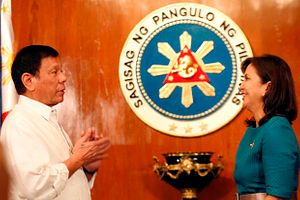Philippine President Rodrigo Duterte’s campaign against illegal drugs has failed to substantially eradicate the menace and ensnare major drug lords and should be reformed to prevent further bloodshed, the country’s vice president said Monday.
Vice President Leni Robredo, who leads the opposition, also called for a stop to the dreaded police practice of home inspections that have led only to the killings of petty drug suspects.
It’s the latest criticism of Duterte’s notorious crackdown by the vice president and is likely to deepen the political divide between the two leaders.
Presidents and vice presidents are elected separately in the Philippines, resulting in candidates from rival parties like Duterte and Robredo ending up in the country’s top leadership and often colliding on policies.
Robredo said only about 1 percent of the estimated supply of methamphetamine, a powerful banned stimulant locally known as shabu, has been seized in the last three years, since the crackdown was launched by Duterte when he took office in mid-2016.
“Very clearly, based on official data, despite the killings of Filipinos and all the money spent, the amount of shabu and drug money we’ve seized has not gone beyond 1 percent of those in circulation,” Robredo said at a news conference.
“If we really want to end the scourge of illegal drugs, we need to run after the big suppliers and not just the small-time pushers,” Robredo said, adding the campaign would not succeed unless it’s reformed to be more strategic, better organized, and closely supervised in all aspects by the president.
Her remarks were largely based on information gathered during a brief stint in a government anti-drugs committee, which Duterte asked her to help lead last year after being piqued by her constant criticisms of his bloody crackdown. Robredo surprisingly accepted the offer, but Duterte fired her after 18 days after she started seeking confidential information about the campaign.
Presidential spokesman Salvador Panelo dismissed Robredo’s statements, saying Duterte’s campaign has succeeded in closing many drug laboratories and forcing the surrender of a large number of drug suspects. Big-time drug lords have also been neutralized, Panelo said, although he failed to immediately provide a list of those key drug personalities.
“If you noticed, when she was threatening to release this report, she implied that there were some irregularities discovered, a bomb that would explode on your face. It’s a dud,” Panelo told reporters.
Robredo, a 54-year-old former human rights lawyer and political newcomer, has openly criticized the campaign against illegal drugs launched by Duterte, a longtime city mayor and state prosecutor known for his extra tough approach against criminality and brash speaking style.
Robredo has said she accepted Duterte’s offer last year to help oversee the crackdown despite warnings by her advisers and allies, so she may be able to save lives under the campaign.
One of her first moves was to request confidential documents from law enforcers, including a list of key drug suspects targeted under Duterte’s campaign. Duterte warned Robredo about sharing confidential information about the anti-drug campaign with his foreign critics, including human rights advocates.
It’s the latest twist in the unprecedentedly massive crackdown Duterte launched after he took office in June 2016. He promised to end illegal drugs and corruption in six months during the campaign but failed and later acknowledged that he was overwhelmed when he found out the immensity of the problems after becoming president.
More than 6,000 mostly petty drug suspects have been killed in the crackdown after allegedly resisting arrests and more than a million others have surrendered, officials say. But human rights groups have cited a higher death toll and accused some policemen of killing unarmed suspects based on flimsy evidence and altering crime scenes to make it look like the suspects violently fought back.
At least two complaints for mass murder have been filed before the International Criminal Court over the large-scale deaths, but Duterte and the police have denied condoning extrajudicial killings under the crackdown.
Duterte has warned that his bloody campaign will continue up to the last day of his presidency in June 2022.
By Jim Gomez of The Associated Press.
































